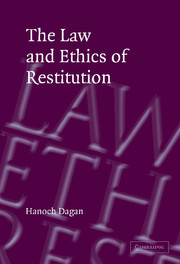Book contents
- Frontmatter
- Contents
- Acknowledgments
- Table of cases
- Table of statutes and treaties
- 1 Introduction
- 2 Preventing unjust enrichment
- 3 Mistakes
- 4 Other-regarding conferrals of benefits
- 5 Self-interested conferrals of benefits
- 6 Restitution in contexts of informal intimacy
- 7 Wrongful enrichments
- 8 Restitution in a contractual context
- 9 Restitution in bankruptcy
- 10 Reasons for restitution
- Bibliography
- Index
2 - Preventing unjust enrichment
Published online by Cambridge University Press: 05 July 2009
- Frontmatter
- Contents
- Acknowledgments
- Table of cases
- Table of statutes and treaties
- 1 Introduction
- 2 Preventing unjust enrichment
- 3 Mistakes
- 4 Other-regarding conferrals of benefits
- 5 Self-interested conferrals of benefits
- 6 Restitution in contexts of informal intimacy
- 7 Wrongful enrichments
- 8 Restitution in a contractual context
- 9 Restitution in bankruptcy
- 10 Reasons for restitution
- Bibliography
- Index
Summary
“A person who is unjustly enriched at the expense of another is liable in restitution to the other.” These are the words of the first section of a partial draft of a new (and exciting) Restatement (Third) of Restitution and Unjust Enrichment. These words repeat almost verbatim the language of the first section of the first Restatement, published in 1937, so that the “central achievement”of the old Restatement – the “identification of unjust enrichment as an independent basis of substantive liability” – will be carried forward. Along these lines, the new Restatement further prescribes that “[t]he source of a liability in restitution is the receipt of an economic benefit under circumstances such that its retention without payment would result in the unjust enrichment of the defendant at the expense of the plaintiff.”
Since the very inception of restitution as a field with the publication (in the United States!) of William Keener's treatise on quasi-contracts in 1893, the role of the principle of preventing unjust enrichment in the law of restitution has been and still is a matter of some intense debate. But Keener's position – placing the principle against unjust enrichment as the normative foundation of the law of restitution – is by now the orthodoxy. The new Restatement reflects modern-day American restitution law, which is dominated by the language of preventing unjust enrichment.
- Type
- Chapter
- Information
- The Law and Ethics of Restitution , pp. 11 - 36Publisher: Cambridge University PressPrint publication year: 2004

